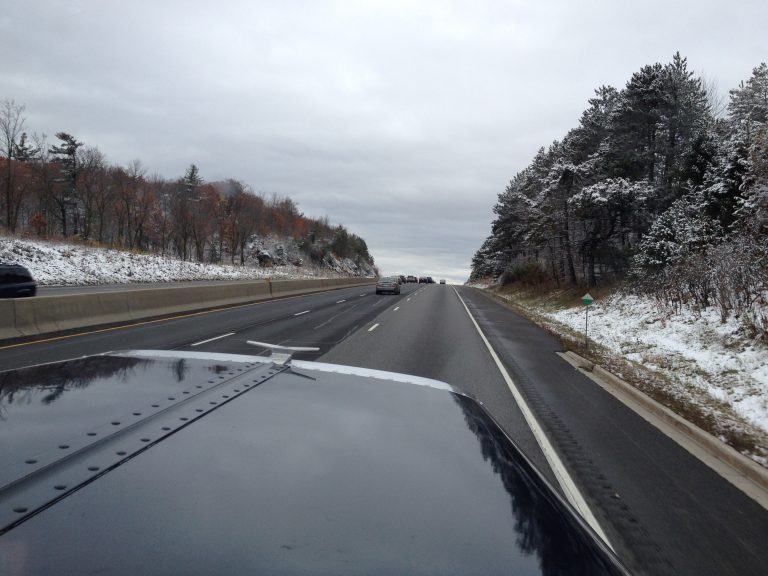How Lack of Sleep Affects Your Driving as a Truck Driver

Lack of sleep affects your driving as a professional driver in a serious way.
As a truck driver, you have a professional duty to stay safe on the road.
Commercial vehicles are much larger and harder to drive than personal vehicles.
They require more concentration and precision, which automatically puts truckers at higher risk for accidents even when you’re not tired.
Lack of Sleep Increases the Risk
However, when you’re suffering from lack of sleep on top of the challenges you already face, that increases your risks even more.
Truck drivers are more susceptible to accidents due to lack of sleep than the average driver.
Since driving is your job and you must adhere to tight schedules and strict deadlines, it’s often necessary to be on the road for long periods without rest.
It’s not uncommon for commercial drivers to spend long periods of time driving.
Sometimes by the time you do have an opportunity to pull over and take a break, exhaustion has already set in.
Then, if you only get two or three hours of sleep before getting back on the road, you’re not really rested enough to be fully alert.

What Happens When You Don’t Get Enough Sleep?
- It’s easy to see why so many truck drivers don’t get enough sleep, but does it really make a difference?
- Does it make being on the road more dangerous for you and the other drivers you encounter along your way?
- Does it make you more prone to accidents?
The answer to these questions is yes.
It does affect your driving in a negative way.
Here’s an alarming fact:
Driving with less than the recommended eight hours of sleep each night is equivalent to driving with an alcohol blood content level of 0.10.
Therefore, it affects your driving in many ways.
Related Article > Sleep Tips to Fall Asleep Quick + Easy
How Lack of Sleep Affects Your Driving
You’re easily distracted – It’s hard to stay focused when you’re tired especially when you’re driving.
You may find yourself thinking about everything except driving, which makes it harder to respond quickly when you need to brake or change lanes.
You may also find yourself fiddling with the radio or looking around instead of focusing on the road.
Driving makes you sleepy – The road has a hypnotic effect after you’ve been driving for a while, which automatically makes you feel drowsy.
When you’re already suffering from lack of sleep, this intensifies and makes it very difficult to keep your eyes open.
It slows down reaction time – When you encounter a problem, whether it’s the vehicle in front of you suddenly slowing down or someone pulling out in front of you, you need to react fast.
Big trucks don’t stop as quickly as personal vehicles do, which means you have less time to respond to situations.
You need to react faster to avoid an accident or at least have less of an impact.
When you don’t get the required amount of sleep, your reaction time is slower.
That increases your risks for having a bad accident because sometimes, all you have is a split second to respond.
It’s harder to remember things – Not getting enough sleep puts your brain in a mental fog.
It’s hard to remember simple directions much less complicated ones. You may forget some important details with the loading or unloading instructions or simply take a wrong turn that puts you behind schedule.
When you’re tired, you make more mistakes.
The human body needs a certain amount of sleep to function at full capacity.
When you don’t get the recommended eight hours of sleep per night and drive, your chances of having an accident greatly increases.

Signs of Driving Drowsy (Lack of Sleep)
Now that you know how lack of sleep affects your driving, you should know what signs to look for that indicate you’re too tired to be behind the wheel.
Sometimes, people think they can handle things that they really can’t, like driving without getting enough rest.
But you may not be doing as good of a job as you think you are.
Knowing what signs to look for could help prevent you from making this type of mistake.
Here are the signs of driving drowsy you should be aware of:
- Constant yawning and eyes watering
- Time slipping by faster than you thought it should
- Your head feels too heavy or you’re nodding off
- Excessive blinking and eyes burning
- Missing your exits or having difficulty remembering the last few miles you’ve driven
- Running off the side of the road, into another lane or tailgating
- Forgetting where you are and where you’re going for a few minutes
- Feeling irritable and restless or having angry feelings towards other drivers
- Daydreaming or thinking about everything except driving
When you notice one or more of the signs above, it’s time to pull over.
It’s much better to take a short break to rest your eyes and take a nap if possible than to keep pushing and end up having an accident.
After your nap, drink a cup of coffee or bottle of water and take a short walk to get rejuvenated before getting back on the road.

How Can Truck Drivers Get More Sleep?
Truck drivers must be on the road for long hours to fulfill their obligations but that doesn’t mean you can’t find ways to get more sleep.
Start by understanding the importance of getting enough rest to keep your body going.
Then look for ways to sleep more and improve the quality of the sleep you do get.
Here are some ways for you to get more sleep:
Plan your trip and schedule time to sleep – It’s never a good idea to just drive until you feel like you can’t keep your eyes open any longer.
Instead, plan the trip in advance and decide then where and when you will sleep. Try to schedule sleep during the times you would normally be sleeping as much as possible for the best results.
Prepare a good place to sleep – Naturally, you’re going to sleep better in some nice, comfortable bed but that’s not usually an option when you’re a truck driver.
Most truckers pull over at a rest stop and sleep in the truck. It’s convenient and it saves money.
Still, you can improve the conditions in your sleeping area to make it more suitable so you can rest better.
For example, make sure the mattress and pillow are comfortable.
Have a comfortable blanket to cover up with and put up dark curtains to keep the sun out during the day.
Avoid drinking caffeine within a few hours of your planned sleep time.
It’s hard enough to fall asleep when on the road because your mind is racing and you’re not in the comforts of your own home.
Don’t make it harder by filling your body with caffeine.
Even if you do still fall asleep after consuming caffeine you won’t rest as well, so you’re not getting quality sleep.

Take a walk or do some type of light physical activity before going to bed – It’s hard to get much exercise when you’re driving a truck for extended periods but try to find time to get a little workout in.
It will help relieve some of the stress and make you more tired, so it’s easier to fall asleep and stay that way through your scheduled sleep time.
Take a Power Nap. After many years of experimenting, I’ve learned something about taking a ‘nap’. The long naps? They just make me want more sleep and I don’t particularly feel refreshed.
I’ve recently learned the reason why. If you wake up when you are in a ‘deep sleep’ stage, by a noise or an alarm for example, it will upset your well being for the rest of the day.
But taking a short nap let’s say for 20-30 minutes, alarm set, you just rest easily and doze off into ‘light sleep’ and can wake up feeling refreshed and energized. So do consider a power nap if you need to take the ‘edge off’.
Quality Sleep Greatly Reduces Risk
Driving a truck is a very demanding job that takes a toll on your body.
Take care of yourself and reduce your risk of having an accident by taking steps to get more quality sleep when on the road.
Related Articles






